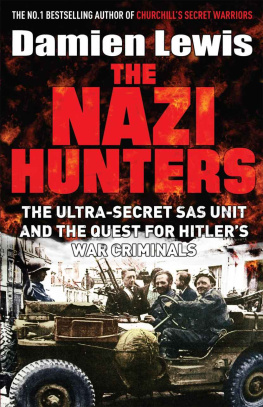

Contents
For my parents, Babs and Willy Reich, with love
CHAPTER
AT NINE OCLOCK, ON A WARM JULY evening in the Bavarian Alps, Erich Seyss stepped from the doorway of his assigned barracks and walked briskly across the grass toward the burned-out stable that housed the prisoners latrine. He wore a shapeless gray uniform that carried neither rank nor insignia. No cap adorned his head. Only his arrogant gait and undaunted posture remained to identify him as an officer of the German Reich. In the distance, the suns last rays crowned snowcapped peaks with a hazy orange halo. Closer, and less angelic, twin barbed-wire fences and a succession of spindly-legged watchtowers surrounded a five-acre enclosure, home to three thousand defeated soldiers.
POW Camp 8, as it was officially designated by the United States Army of Occupation, sat in a broad meadow on the western outskirts of Garmisch, a once chic resort that in 1936 had played host to the Winter Olympic Games. Until three months earlier, the compound had served as the headquarters of the German Armys First Mountain Division. Like Garmisch, it had escaped the war unscathedweathered, perhaps, but untouched by a single bomb or bullet. Today, the assembly of stout stone buildings and low-slung wooden cabins housed what Seyss had heard an American officer refer to as the scum and brutes of the German Army.
Seyss smiled inwardly, thinking the loyal and proven was more like it, then jogged a few steps across the macadam road that bisected the camp. In contrast to his relaxed demeanor, his mood was turbulent, a giddy mix of anxiety and bravado that had his stomach doing somersaults and his heartbeat the four-hundred-meter dash. To his left ran the prisoners barracks, a row of stern three-story buildings built to sleep two hundred men, now filled with a thousand. Farther on hunched a weathered cabin that housed the radio shack, and ten meters past that, the camp commanders personal quarters. Barely visible at the end of the road was a tall wooden gate swathed in barbed wire and framed by sturdy watchtowers. The gate provided the camps sole entry and exit. Tonight, it was his destination.
In ten minutes, either he would be free or dead.
He had arrived at the camp in late May, transported from a hospital in Vienna, where he had been recovering from a Russian bullet to his lower back. The wound was his third of the war and the most serious. Hed suffered it in a rearguard action against lead elements of Malinovskys Ninth Army, maintaining a defensive perimeter so his men could make it across the Enns River and into the American zone of occupation before the official end of hostilities at midnight, May 8. Surrender to the Russians was not an option for soldiers whose collar patch bore the twin runes of the SS.
A week after his surgery, a chubby American major had showed up at his bedside, a little too solicitous of his good health. Hed asked how his kidney was and confided that a man didnt really need a spleen. All the while, Seyss had known what he was after, so when finally the major demanded his name, he gave it voluntarily. He did not wish to be found in two months time cowering in his lovers boudoir or hiding beneath his neighbors haystack. Peeling back his hospital smock, he had lifted his left arm so that the SS blood group number tattooed on its pale flank could be read. The American had checked the group number against that written on his clipboard, then, as if declaring the patient cured, smiled, and said, Erich Siegfried Seyss, you have been identified by the Allied powers as a war criminal and are subject to immediate transfer to an appropriate detention facility, where you will be kept in custody until the time of your trial. He didnt provide any specifics as to the nature of the crimes or where they were alleged to have taken placeon the Dnieper, the Danube, the Vistula, or the Ambleve, though Seyss acknowledged it might have been any one of those places. The major had simply produced a pair of handcuffs and locked his right hand to the beds metal frame.
Recalling the moment, Seyss paused to light a cigarette and stare at the fiery silhouette of the mountains surrounding him. He considered the charge again and shook his head. War crimes. Where did the war end and the crimes begin? He didnt loathe himself for acts from which other, lesser men might have shrunk. As an officer who had sworn his loyalty to Adolf Hitler, he had simply done as hed been told and acted as honorably as circumstances did or did not allow. If the Allied powers wanted to try him, fine. Hed lost the war. What else could they do?
Dismissing his anger, Seyss cut behind the hall, then traversed a dirt infield littered with bales of firewood. Dusk brought quiet to the camp. Prisoners were confined to their barracks until dawn. GIs freed from duty hustled into town for a late beer. Those staying behind gathered in their quarters for heated games of poker and gin rummy. He walked slower now, guarding the shambling pace of a man with nowhere to go. Still, a sheen of perspiration clung to his forehead. He ventured a glance at the wristwatch taped high on his forearm. Three minutes past nine. Tonight everything would hinge on timing.
Fifty feet away, a lone sentry rounded the corner of the latrine. Spotting Seyss, he called, Hey, Fritz, get over here. Time for bed check. Whatre you doing out?
Seyss approached the GI, pleased he was precisely on schedule. Just have to make a pee, he answered in English. Plumbings messed up and gone to hell. No hard feelings, though. It was Ivans doing, not yours. Born of an Irish mother and a German father, hed grown up speaking both languages interchangeably. He could recite Yeats with a Dubliners impish brogue and quote Goethe with a Swabians contemptuous slur.
Just give me your pass and shut up.
Seyss retrieved a yellow slip from his pocket and handed it over. The pass cited an irregularly functioning kidney as grounds for permission to visit the latrine at all hours.
The sentry studied the slip, then pointed at his watch. Bedtime, Fritz. Curfew in five minutes.
Dont worry, Joe. Ill be back in plenty of time for my story. And dont forget a glass of warm milk. I cant sleep without it.
The sentry handed him back the pass, even managing a laugh. Just make it snappy.
Seyss said yessir, then moved on toward the latrine. Americans were easily seduced by foreigners who could speak their language and hed been quick to take advantage of their garrulousness, using any pretext to ask carefully disguised questions about the camps security. What hed learned was useful to a man with an eye bent on escape. Twenty-four soldiers were posted on night watchone in each of the eleven towers that ringed the camp, ten walking the area perimeter and three in the camp commanders office located just inside the gate. Only seven of the 150-man camp garrison had been in Germany longer than three months. The rest were replacement troopsgreen soldiers who had never fired a gun in anger. Most interesting, Colonel Janks, the reed-thin martinet who commanded the camp, had forbidden the use of the klieg lights mounted in the watchtowers except in emergency situations. He had cited a paucity of diesel oil as the reason, but word around camp said otherwise. Janks was selling the oil for dollars on the black market.
Stepping into the latrine, Seyss took a last drag on the cigarette, then threw it into the slit trench running the length of the stable. Despite the absence of a roof and the steady breeze sweeping the building, the stench was ungodly. He smiled grimly. At least he wouldnt have to bear this particular hardship any longer.
Next page







